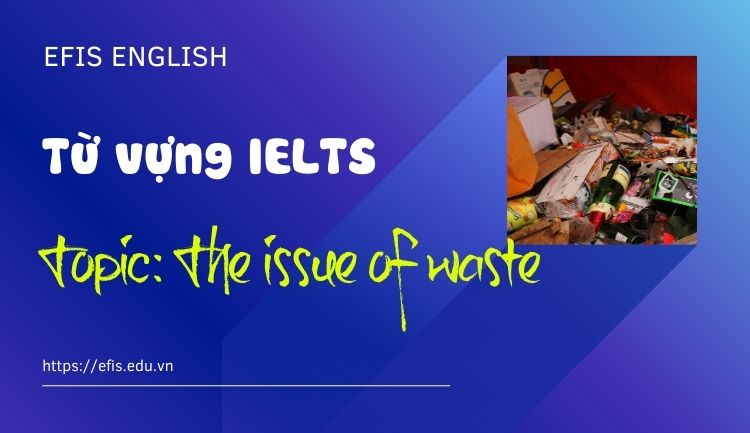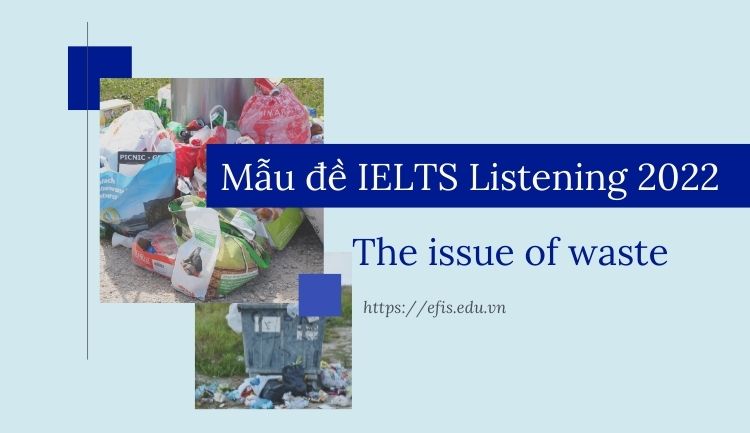Nằm trong chủ đề The issue of waste, cùng Efis học một số từ vựng IELTS mới liên quan đến chủ đề thú vị và mang tính thời sự này nhé.
Từ vựng IELTS chủ đề The issue of waste
Trước khi học các từ vựng IELTS chủ đề này thì bạn có thể luyện nghe thông qua các bài tập liên quan nhé! Bấm vào đây để làm bài tập luyện nghe!

– the issue of waste: vấn đề rác thải
– an immense problem: một vấn đề nhức nhối
– huge challenges: những thách thức to lớn
– the model of nature: mô hình của thiên nhiên
– a completely cyclical system: một hệ thống hoàn toàn theo chu kỳ
– excess waste: chất thải dư thừa
– be generated: được tạo ra
– intelligence and ingenuity: sự thông minh và khéo léo
– evidence (n): bằng chứng
– municipal waste collection: thu gom rác thải đô thị
– waste disposal: nơi xử lý rác thải
– the Dark Ages: thời kỳ đen tối => chỉ thời kỳ đầu của thời kỳ trung cổ hoặc thời kỳ trung cổ ở Tây Âu sau khi Đế chế Tây La Mã sụp đổ, đặc trưng cho nó được đánh dấu bởi sự suy giảm kinh tế, trí tuệ và văn hóa.
– municipal waste processing: quá trình xử lý rác thải đô thị
– the natural processes of decay: quá trình phân hủy tự nhiên
– be absorbed (v): bị hấp thụ
– claim (v): cho rằng
– health problems: các vấn đề về sức khỏe
– convincing evidence: bằng chứng thuyết phục
– rubbish and disease: rác thải và bệnh tật
– the generation of waste: sự sản sinh rác thải
– melt (v): tan
– modern consumer goods: hàng tiêu dung hiện đại
– the invention of plastic: phát minh ra nhựa
– the root of the problem of waste: gốc rễ của vấn đề rác thải
– accelerate (v) in growth: tăng nhanh
– industrialized (adj): công nghiệp hóa
– mass manufacturing: việc sản xuất hàng loạt
– the planet’s surface: bề mặt trái đất
– go away: biến mất
– disposable goods: hàng hóa chỉ sử dụng 1 lần
– discard (v): loại bỏ
– figure (v): số liệu
– waste treatment: xử lý chất thải
– a measurement of consumerism: một thước đo hiệu quả về chủ nghĩa tiêu dùng
– the burning process: quá trình thiêu hủy
– landfill sites: các bãi chôn lấp
– densely populated and mountainous countries: các nước đông dân cư và nhiều đồi núi
– recycle (v): tái chế
– the recycling processes: quá trình tái chế
Bài đọc
The issue of waste
Good afternoon, everybody. Today I’ll be talking about the issue of waste, which has become an immense problem in today’s society. We face huge challenges in terms of reducing its creation in the first place and then in dealing with it when it has been created. Now, the model of nature would be our ideal – a completely cyclical system in which no excess waste is generated that can’t be processed by itself. However, we humans have proved, despite our apparent intelligence and ingenuity, quite incapable of achieving this. Where did it all go wrong? We have evidence that in ancient Greece and Rome governments operated municipal waste collection, and a huge Stone Age mound was identified some years ago in Norway as waste disposal, so we can see that people have been generating waste for a very long time indeed. However, during the Dark Ages, sophisticated municipal waste processing disappeared. The medieval answer to waste was to throw it out of the window. But this waste, apart from broken pottery and a few metal objects, was largely organic.
This meant, of course, that it was quickly absorbed into the environment by the natural processes of decay. However, many concerned people, such as doctors, claimed that this created health problems, although it wasn’t until science produced convincing evidence of the connection between rubbish and disease that governments began to see the importance of dealing with the problem effectively.
Unfortunately, their response has remained slower than the generation of waste. It is very hard to deal with waste that won’t melt into the environment, as so many of our modern consumer goods won’t, and that’s why the invention of plastic has caused the worst headache for the environment – it’s more than nature can deal with.
In order to address the root of the problem of waste, we need to think about what has made the quantity of waste accelerate in growth. I’d identify three main reasons. As many countries became industrialised, we saw the advent of mass manufacturing. This has been enormously damaging as it has greatly increased the amount of things on the planet’s surface which don’t go away by themselves.
Closely related to this is packaging – necessary for transporting things around the world, but then extremely difficult to get rid of properly.
And a third aspect to the problem has been disposable goods. We have become accustomed to so many things being to use and then discard that we find it hard to imagine life without them. And yet we spare little thought for where they go when we do discard them.
Right now, let’s move on from where all this waste comes from to what is done with it all now it’s here. Different countries deal with waste differently. Of course, each country also changes what it does, so the figures for waste treatment I’ve got here are likely to change in the future. Let’s look at Municipal Solid Waste, or MSW. MSW is important to consider because it’s effectively a measurement of consumerism – how much waste people produce that goes beyond the absolute basic requirements in life to eat and drink.
One of the main ways of dealing with MSW is incineration -burning it. This is adopted variously around the world. The UK burns relatively little waste, as does the US, while Denmark burns about half of all waste, and Japan uses this method for as much as three quarters.
These are broad brush strokes, of course, because an important issue is how efficient and clean the burning process is. Another major form of waste treatment is using landfill sites – basically, burying the waste in the earth. Currently, this method is the dominant process used in the UK at over 80%. and is also heavily used in Germany and in the US, while densely populated and mountainous countries such as Switzerland and Japan dispose of relatively little this way.
A third – and much better way of dealing with waste is to recycle it, turning it back into more things we need. It must be said that much depends here on whether further waste is generated by the recycling processes themselves. The UK and Japan have rather poor records in recycling, while Switzerland tops the table in this respect, and reasonably impressive levels are achieved by Denmark and Germany. I really hope that if we all gathered here again ten years from now, these figures would be much higher. Time – and a lot of effort – will tell.
Từ vựng IELTS | Topic: The issue of waste

Nếu bạn quan tâm khóa học tiếng Anh Dẫn Tour Giao Tiếp Thực tế hay khóa học luyện thi IELTS của Efis English, hãy nhắn ngay cho tụi mình để được tư vấn miễn phí nhé!
————————————————————————————–
Efis English – Hanoi Free Private Tour Guide
✯ https://efis.edu.vn/
♟158 Chùa Láng, Đống Đa, Hà Nội
☎ 0961.764.299
☞ efisenglish@gmail.com
✤ Fanpage IELTS: IELTS Complete – IELTS Toàn diện
✤ Fanpage EFIS ENGLISH: EFIS English – Học tiếng Anh thực tế
✤ Fanpage HANOI FREE PRIVATE TOUR GUIDE:
Hanoi Free Private TOUR GUIDE – Dẫn tour cho người nước ngoài Học tiếng Anh
✤ TikTok: Efis English
✤ Youtube: Efis English – Hanoi Free Private Tour Guide
Có thể bạn quan tâm:
IELTS tips 2022 | 10 điều nên biết để đạt điểm cao
Bài mẫu IELTS Writing Task 1 dạng Bar Chart
Luyện mẫu đề IELTS Listening | Hiring a public room
Luyện đề mẫu IELTS Listening 2022 | A debit card











